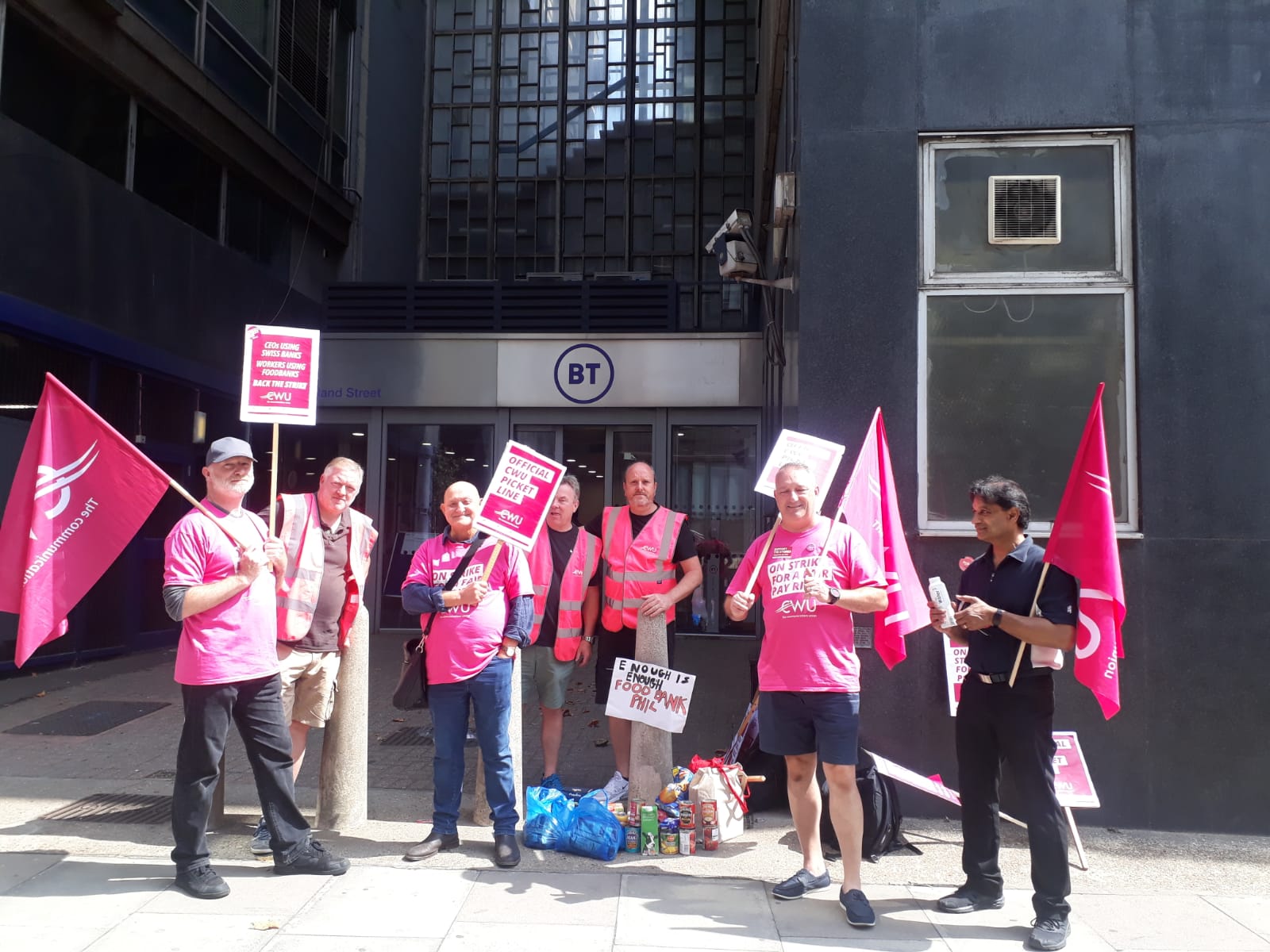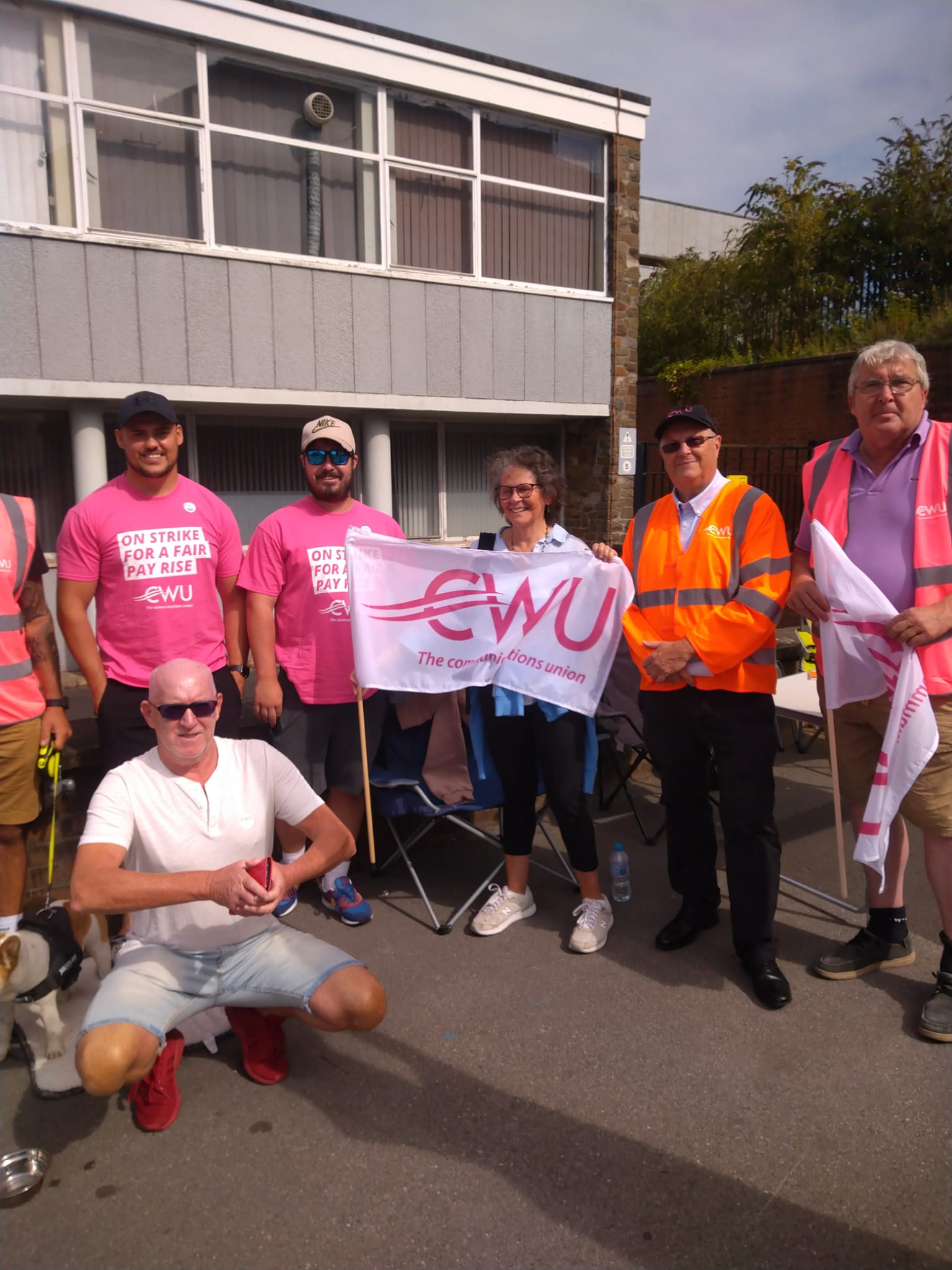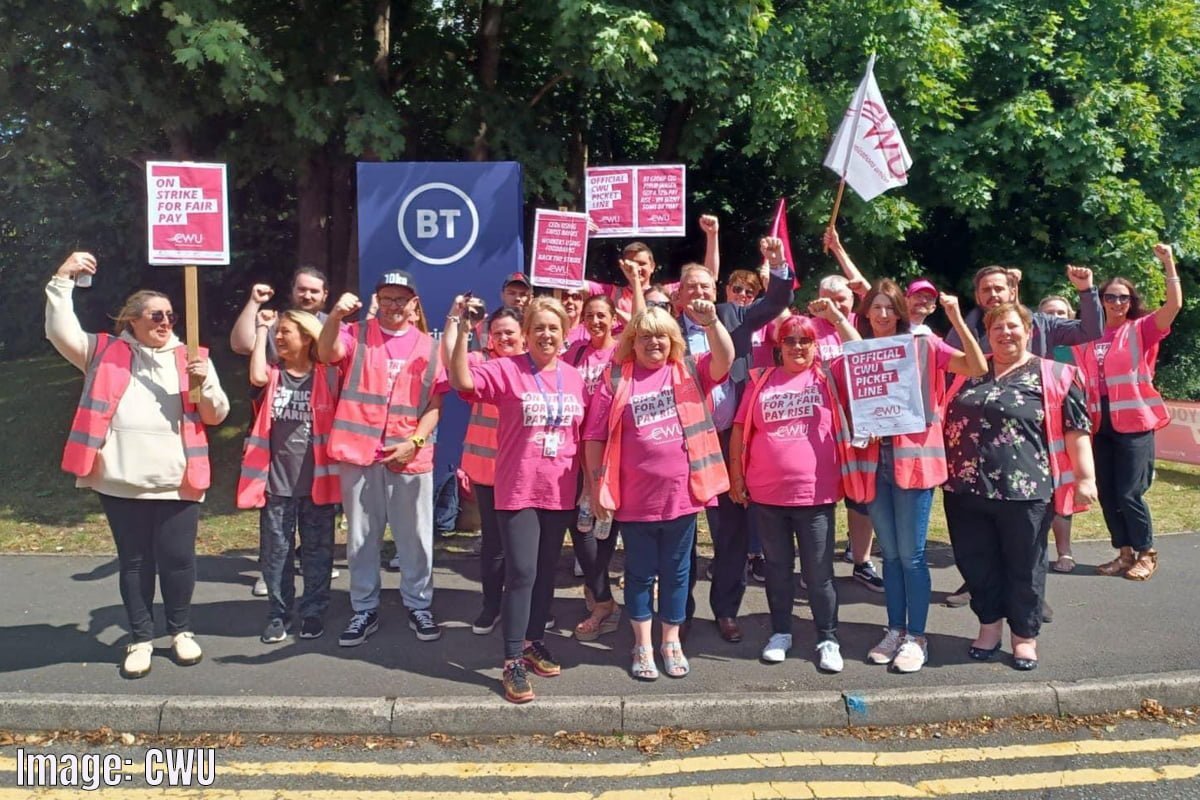Last Friday (29 July) and yesterday (1 August) saw national strike action by around 40,000 telecoms workers at BT Group.
Organised by the CWU (Communication Workers’ Union), the workers are striking over pay, with BT bosses presenting a measly below-inflation offer of just £1,500 per year for all employees.
As the reports below from local Socialist Appeal supporters indicate, both days of action saw pickets outside company offices and depots across the country, with BT call-centre workers and Openreach engineers joined by local activists offering support and solidarity.
We are old enough to remember when BT Group said people wouldn’t support strike action. pic.twitter.com/8gdPTH6lir
— The CWU (@CWUnews) August 1, 2022
The strong showing on these CWU picket lines follows on from similar displays of strength during the strikes by the RMT and other rail workers.
It is clear that these determined struggles by workers are breathing confidence throughout the trade union movement, raising the idea of strikes in the consciousness of the whole working class.
And this, in turn, is encouraging workers in other industries to take action against the bosses and Tories, with civil servants, teachers, and NHS staff all moving towards strike ballots in the coming months.
Similarly, over 115,000 CWU members at Royal Mail have voted for strike action, which is likely to take place later this month.
As a result, pressure is mounting within the labour movement. Starmer’s Labour leadership is coming under fire for ordering MPs not to attend picket lines or support striking workers. And trade union leaders are being pushed by rank-and-file members into organising escalated action.
Speaking on the picket lines and in the media recently, for example, CWU general secretary Dave Ward raised the need for coordinated action to defend workers’ pay, conditions, and democratic rights; for “collective action that every worker in the UK can participate in”.
If attacks on all workers continue then we will develop forms of collective action to defend ourselves. pic.twitter.com/QNpT7aS5pS
— Dave Ward (@DaveWardGS) July 29, 2022
This follows on from recent suggestions by RMT leader Mick Lynch that the unions could call for a political general strike against the Tories, if Liz Truss – the prospective next prime minister – follows through on her threat to launch a wave of attacks on the trade unions.
Explosive class struggles are therefore looming, unlike anything this country has seen in decades. The working class is flexing its muscles, preparing for battle.
What is needed is a militant leadership capable of translating defiant words into bold deeds: to unite all these fights through coordinated action; to organise a mass campaign that can topple the Tories; and to mobilise workers and youth around a clear socialist programme that can provide a genuine solution to the crisis of capitalism.
London

The picket line was strong at the BT Tower in London for the second day of strike action by BT Openreach workers.
Yesterday’s picket was definitely bigger than the previous strike day last Friday, with about a dozen workers present, along with groups of activists showing solidarity.
There was also a large presence from the press, who had come to see CWU general secretary Dave Ward give a speech.
Ward spoke about the need for collective action alongside other unions, including the RMT and Unite, in order to unite the struggles. This was met with large applause.
CWU reps we spoke to on the picket line said they were particularly enthused to hear that steps are being taken in this direction by the union leaders.
“I have spoken with Mick Lynch @RMTunion and @GMBGarySmith and @UniteSharon and we believe is time now to consider calling for forms of collective action that every worker in the UK can participate in.”@DaveWardGS tells @CWUnews members to applause at BT Tower picket line. pic.twitter.com/QiQ2gavaL3
— Alex Gordon #JoinAUnion (@alexgordon4me) July 29, 2022
A number of workers and reps, however, noted the lack of action taken by Prospect, the union representing managerial layers at BT.
We also spoke with one striker, a BT engineer, who said that “all of this is very new” – meaning organising in the trade union and taking strike action, but also thinking more broadly about politics.
This shows how new layers of workers are moving into action as a result of the deepening crisis and the bosses’ attacks.
This same worker went on to say that “the system doesn’t work and people are unhappy”, adding that he considers himself a relatively privileged worker, with a higher-than-average salary, but that he feels it necessary to sacrifice a few days’ pay in order to support other workers in their fight for decent wages and conditions.
Morale was high amongst the strikers, and there was justified anger towards management, who haven’t made much effort to engage in talks. Union reps also noted that poor pay and conditions have resulted in a large turnover rate of workers in the business.
Speaking on the picket line, Dave Ward also stated that the CWU was likely to organise more action amongst telecoms workers in the near future – an assertion that was confirmed by the workers we spoke to. So watch this space!
Cardiff

There was a friendly and welcoming mood at the BT Openreach picket line in Cardiff last Friday, which was around 50-strong at its height.
Various TV news channels were present, alongside activists showing support and solidarity. It is clear that the recent strikes by RMT members have galvanised the local labour movement, in this respect.
Strikers we spoke to discussed the below-inflation pay offer they have received, comparing this to the general profiteering of the company’s executives.
One Openreach engineer called Luke correctly highlighted the need for nationalisation of what is essentially a monopolised telecoms industry.
Notably, there was a younger layer of union members present on the picket line, showing how workers are being drawn into the struggle.
Sheffield
We attended the CWU picket line in Sheffield town centre yesterday morning, where we talked with the workers about how they thought the strike was going and what’s needed next.
Union members were unsure about the two days of strike action – most wanted at least a week. They don’t see any prospect of the bosses coming to the table, with one worker describing the bosses as having “a siege mentality”.
We raised the idea of coordinated strike action, with mass rallies in support, as Dave Ward and other union leaders have suggested. This got immediate agreement amongst the strikers.
Telecoms workers are on strike over pay. Their chief worry is about the hike in energy bills. But most also noted that we’re not ‘all in this together’, as RMT general secretary Mick Lynch has also emphasised in interviews.
Strikers we spoke with were enthusiastic to discuss a Marxist perspective on economics, in this respect. Such a perspective leads to the conclusion that we must go further than fighting for a redistribution of the wealth in society. To genuinely end inequality, we need to demand collective ownership over the monopolies, and plan the economy on the basis of need.
Leicester

BT Openreach workers at the Leicester depot are confident and determined, showing no signs of backing down.
Around two dozen BT installation and repair engineers were making a stand at the picket line yesterday, protesting against years of attacks on their working conditions and pay.
By contrast, the company has made profits of £1.3 billion, with BT Group CEO Philip Jansen enjoying a 32% pay increase to £3.5 million per year.
During the pandemic, these workers had been labelled as ‘heroes’, risking their health in order to ensure that households remained connected. In return, they have been offered a measly £1,500 per year increase – their first pay increase for two years.
Alongside a deliberately complicated system of shares and non-contributory bonus schemes that some of the workforce find themselves on, this equates to around a 6% pay increase for those on the lowest grades. For those on higher grades, it amounts to about 3%.
Meanwhile, the RPI inflation rate stands at almost 12%. So all workers are being offered a real-terms pay cut.
All the workers on the picket lines were in no doubt that – after what they have been through – they deserve a proper pay rise.
But they also realise the challenge ahead. Defeat in this struggle would allow the current race to the bottom to continue.
Spurred on by the solidarity on display, however, the mood was one of optimism and fighting spirit.
Passing drivers honked in support, and hardly one van crossed the picket line. One delivery driver – not part of BT – even refused to pass the picket line, risking his day’s pay, and possibly more.
Today’s economy relies on a fast and reliable internet infrastructure. You could feel the pride that these skilled workers had for their work, in this respect.
One was involved in delivering fibre broadband for Nottingham City. Another spoke of the increasing number of line thefts, due to the value of the copper cables used. This results in internet blackouts in whole towns, until these cables can be replaced.
Some workers expressed clear signs of political frustration also. One told us that he had voted Tory his whole life, but not anymore, even showing regret at the way Jeremy Corbyn had been treated as Labour leader.
It is workers like these who create all the wealth in our society. Literally not an email is sent without their permission. But it is the billionaire owners of the monopolies who profit from their labour.
Until workers overthrow this decrepit system, and run society along socialist lines, with democratic planning of the economy, then the class struggle over this wealth will continue.






